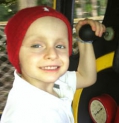Identifying metastasis initiating cells in Ewing sarcoma

Mentor Name: Elizabeth Lawlor
Recent findings from our lab and others have revealed that not all cells within a tumor are alike; Ewing sarcoma tumors are in fact made up of diverse subpopulations of cells with very different behaviors and distinct patterns of gene expression. Importantly, preliminary data indicates that there are subpopulations of cells that may be highly metastatic. Thus, we molecularly characterized individual cells across a dozen models of Ewing sarcoma and found a subset of cells which highly express pro-metastatic mesenchymal-identity genes. Interestingly, this specific subset of cells also turns on genes which are usually suppressed by EWS-ETS fusion expression.
Moving forward, we plan to identify specific surface proteins that will enable the use of FACS to isolate the highly mesenchymal, pro-metastatic tumor cell populations from the non-mesenchymal tumor cells. These cells will then be grown in 3-dimensional culture models, which will mimic how tumors grow within the body. Using these “mini tumor” models, we can assess how these subpopulations differ in gene expression, growth rates, and metastatic invasion. Finally, we will suppress genes that we hypothesize are important for shifting cells towards a mesenchymal fate in hopes of reducing invasion and moving cells away from this aggressive cell state. As we come closer to identifying ways to target these specific cells, studies like the one presented here will allow more targeted and effective treatment plans for patients who suffer from metastatic Ewing sarcoma.

